Devoted Cat Owner Wonders If She Should Inform Her Ex-Boyfriend About Their Elderly Cat's Failing Health
At what point can you consider your significant other's pet as your own? It's easy to get attached to a pet, but is affection alone enough to make you its owner?
The conditions for pet ownership can differ legally from one state to another. Some will require paperwork that proves you have been solely financially responsible for the animal for at least a year.
This will not be a problem when the couple stays together; it's an entirely different ball game when the relationship ends. That's when things really get complicated.
This OP recently found out just how messy things can get. She and her ex-boyfriend broke up after being together for five years.
They lived together and had two cats. The older cat is 18 years old and has been with her ex since he was a child, while the younger cat they adopted together is just 6 years old.
OP found out her ex was cheating on her and immediately kicked him out of the house. He promised to go back for the older cat once he got his own apartment, but he didn't follow through with his plan since he made the promise 11 months ago.
OP knew that her ex was not planning on going back for the cat two months after their breakup. Her ex blocked OP on everything, and she learned about this through one of their mutual friends.
OP didn't mind keeping her ex's old cat since she has been paying for everything the cat needed for about two years.

The problem is, the cat's health is getting worse. Her kidneys are failing, and she has lost a lot of weight, which means OP might have to euthanize the cat sooner than she thought.
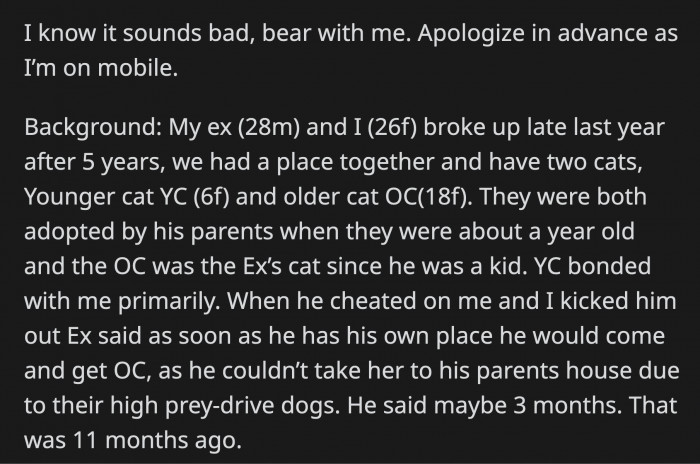
She and her ex talked about which signs to look out for that could indicate the cat's health turning for the worse.

The Emotional Complexity of Pet Ownership
Deciding whether to inform an ex about a pet's health involves grappling with complex emotions and attachment issues.
Dr. Rachel Adams from Yale University emphasizes that pets often symbolize significant emotional connections, making their health a matter of shared concern even after a relationship ends.
Research highlights that unresolved feelings regarding a pet can complicate post-relationship dynamics, influencing choices about communication and care.
Not all of the signs are present, but his decreasing appetite and increased water intake mean his kidneys are barely functioning. OP doesn't want to put the cat through dialysis due to her age.
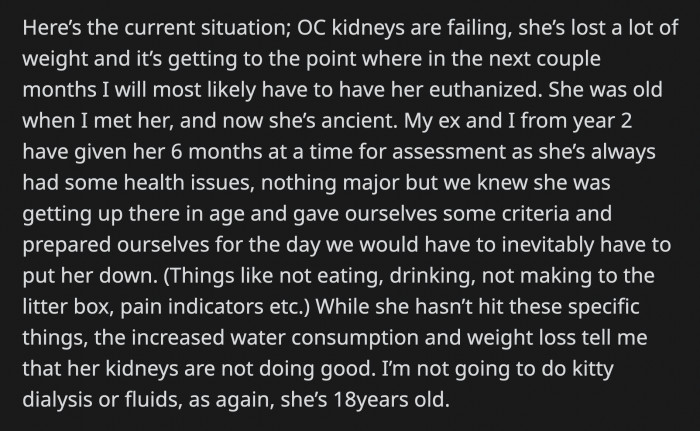
OP considers the old cat to be her ex's, but since he essentially abandoned her without informing OP, the cat has been under her care for a while, and she has the paperwork to prove that.
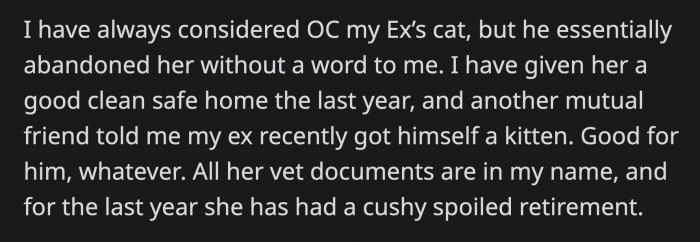
OP doesn't want to tell her ex about euthanizing the cat, and it has been nagging at her. They didn't have an amicable breakup, and she really doesn't want to deal with him.
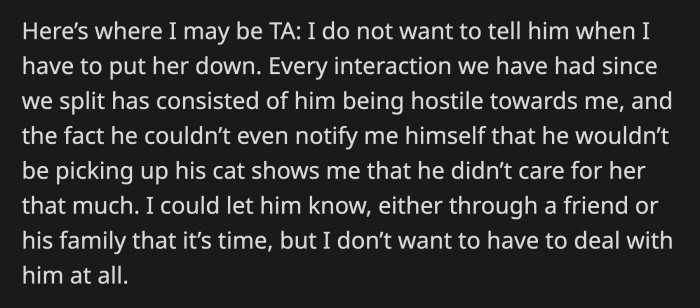
The emotional bonds formed with pets can create a sense of responsibility that persists even after a breakup.
Studies show that individuals often carry guilt and concern for a shared pet, reflecting a broader attachment to the relationship itself.
This can lead to internal conflict about whether to reach out or remain distant, as the individual navigates their feelings about the past relationship.
OP is in the clear with the cat's ownership legally and can make medical decisions for her even without telling the ex. OP wonders if she will be an a**hole if she follows through with her plan without letting her ex know.
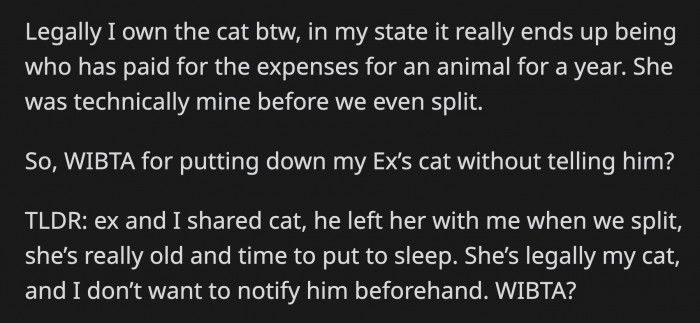
OP replied to the deleted comment about how the breakup went and why she's so against contacting her ex-boyfriend regarding anything.
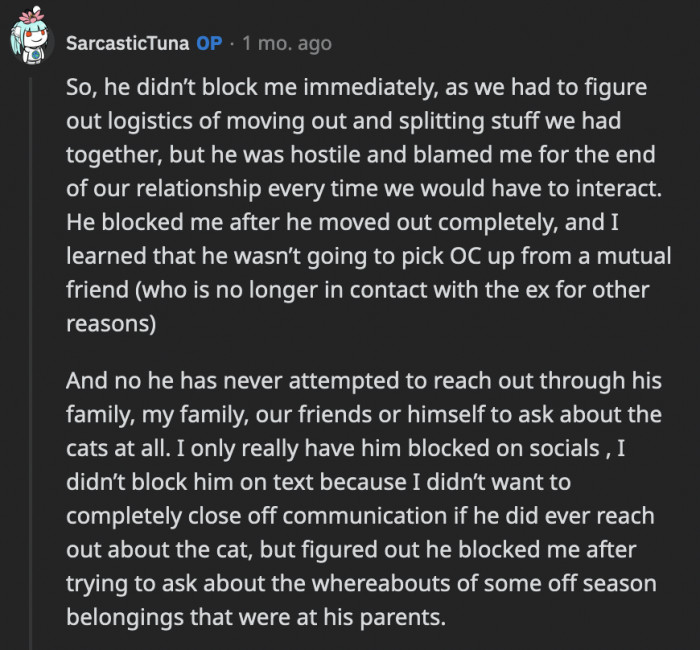
Sure, OP can send her ex a message informing him about the state of the cat, but what would happen if he objects? This commenter doesn't think that OP should, given that her ex abandoned the cat without checking on her.
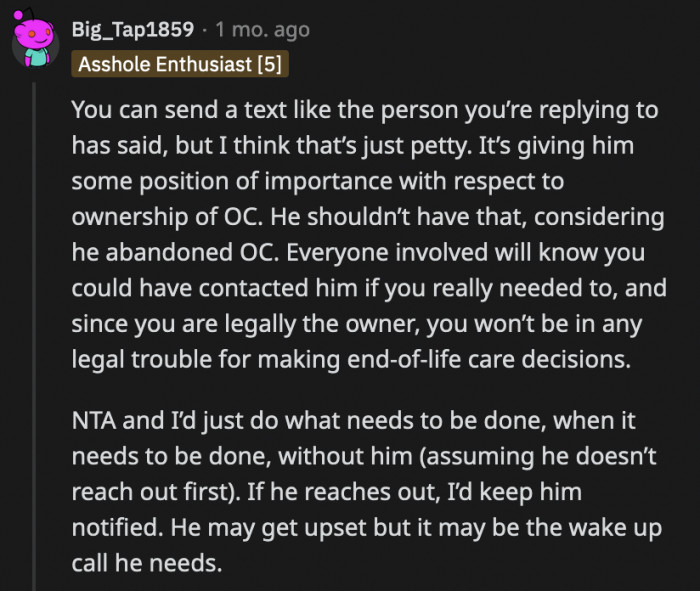
Navigating Communication with Ex-Partners
Clear and compassionate communication is vital when discussing a shared pet's health.
Experts suggest framing the conversation around the pet's well-being while being mindful of the emotional history attached to the relationship.
Utilizing 'I' statements, such as 'I feel it’s important to keep you informed about our cat's health,' can help reduce defensiveness and promote an open dialogue.
None of her ex's behavior pre- and post-breakup indicated that he cared about the cat that much.
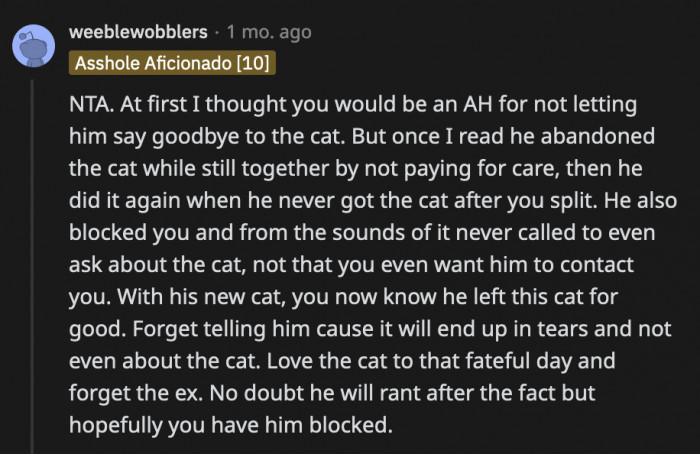
Even before the split, the ex barely contributed to the cat's needs and left it all up to OP and his mom to figure things out.
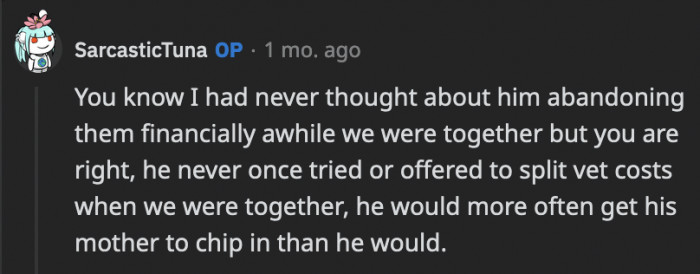
If he learns what happened to the cat, this guy will surely find a way to make it about OP not informing him and hurting him in the process.
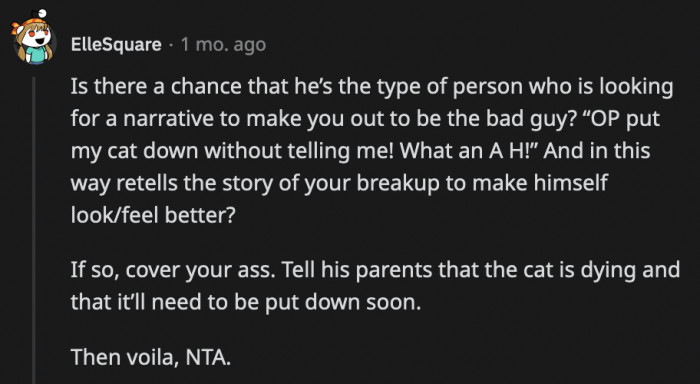
Creating a structured plan for pet care can alleviate some of the emotional burden associated with shared responsibilities.
Therapists recommend discussing potential co-care strategies that honor both parties' emotional connections to the pet without reigniting past conflicts.
This proactive approach can facilitate smoother interactions and ensure the pet receives the care it needs.
Thankfully, OP has a healthy attitude about the opinions her ex and the people around him may or may not have about her and her decisions.

Still, someone said OP should inform him because it is the kind thing to do, and once the cat passes, OP can do nothing to turn back time and undo the a**hole move.
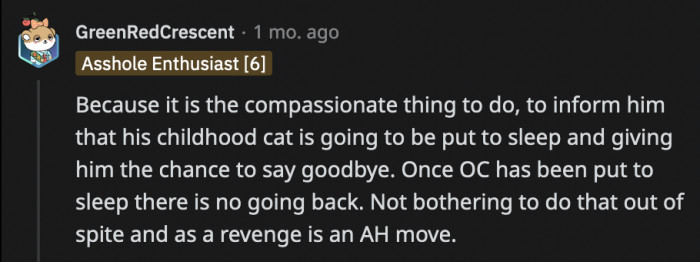
OP says she is leaning towards not informing him because she doesn't want him back in her life, and this is a choice made out of emotional self-preservation, not spite.
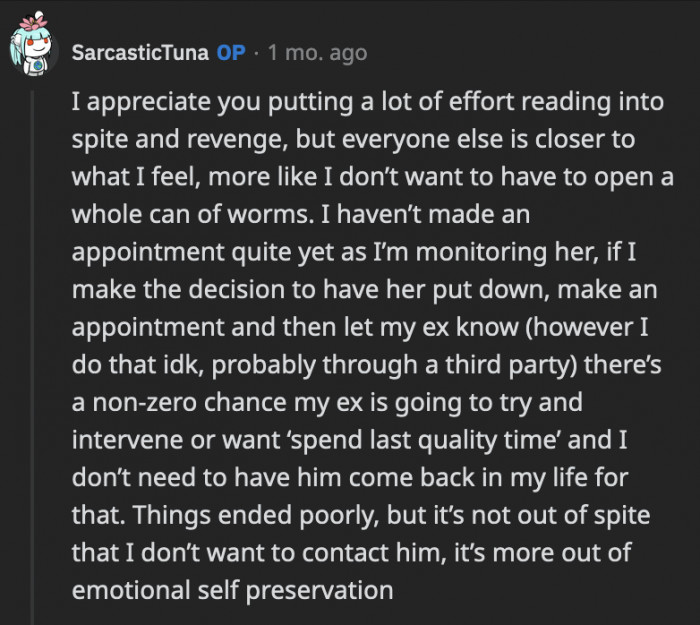
Someone asked if OP tried putting the cat on a different diet to see if it helps with her lack of appetite.
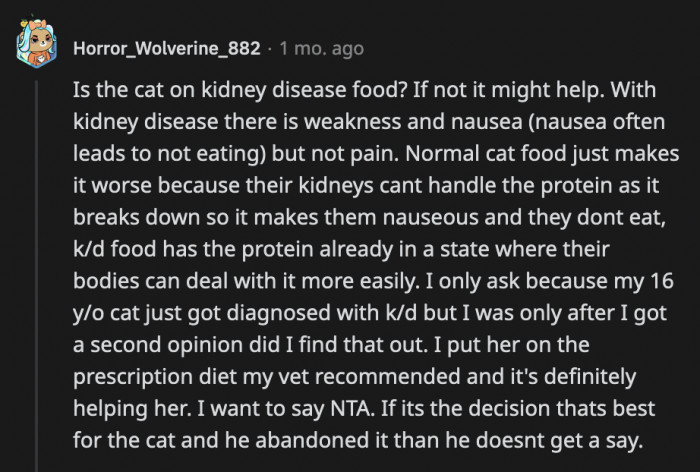
Prolonging her life (and pain) is not the kindest thing for the cat, but OP appreciated the concern nonetheless.
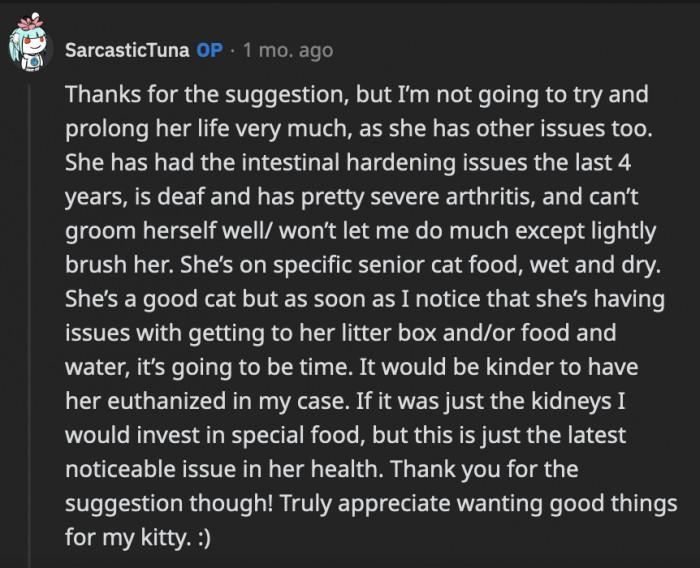
Since OP's ex has been an absentee cat owner long before their breakup, OP doesn't really have to inform him about what she plans to do with the cat. He didn't care enough to go back for her or even check on her after he and OP went their separate ways.
Still, should OP inform him? Based on OP's version of events, that will only complicate things for her and could even be detrimental to the cat.
He might try to stop OP from doing what's best for the cat just to keep the drama going and make himself look like a concerned cat owner who has been wronged by his ex. At this point, OP's only concern should be keeping her elderly cat happy for as long as she can.
Psychological Analysis
It's not uncommon for former partners to feel a lingering sense of obligation towards shared pets, reflecting the emotional bonds formed during the relationship.
This situation underscores the importance of addressing these feelings openly to prevent misunderstandings and promote the pet's well-being.
Analysis generated by AI
Analysis & Alternative Approaches
Understanding the emotional dynamics involved in pet ownership after a breakup is essential for effective communication.
According to Dr. Esther Perel, a renowned couples therapist, "Pets often serve as a bridge between former partners, but this connection can lead to both comfort and conflict, depending on how it is managed." Navigating these feelings is crucial for maintaining a healthy dialogue.



